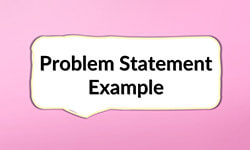
The problem statement poses a crucial section of any dissertation, research project, and thesis, providing a concise and clear outline of the issue the study seeks to address. A well-written problem statement serves as a cornerstone in guiding the research process and sets the foundation for your methodology, findings, and research questions. This article will provide problem statement examples that can serve as models for articulating the critical issues your research aims to resolve.
Definition: Problem statement example
A problem statement is like a lighthouse in the vast sea of research. Its purpose is to provide a brief and straightforward statement that outlines the issue or problem that the study seeks to solve. It highlights the gap in current knowledge or context that the research aims to fill.
- ✓ Free express delivery
- ✓ Individual embossing
- ✓ Selection of high-quality bindings
Writing a problem statement with examples
The first step in writing a problem statement is to identify the problem. The problem could be an unmet need, a gap in knowledge, or an issue that has not been properly addressed. It’s essential that the problem is not just a symptom of another problem, but the actual issue that needs to be addressed.
Once you have identified the problem, the next step is to provide context for the problem. This includes information about who is affected by the problem, where the problem occurs, and what consequences the problem may have if not addressed.
The next step is to explicitly state what will happen if the problem is not solved. This helps readers understand the seriousness of the issue and the importance of finding a solution.
The last step in writing a problem statement is to propose a potential solution to the problem or an approach to finding a solution. The solution doesn’t have to be definitive; it could be what you aim to achieve through your research.
Final problem statement example
Considering all four step, the final problem statement could look like this:
This problem statement clearly states the problem, provides context, discusses the consequences of inaction, and proposes a research approach to find solutions. Following these steps will guide you in writing a comprehensive, clear, and effective problem statement for your research.
Do’s and don’ts for an effective problem statement
Dos
- Be concise: Stick to the point for a direct problem statement example.
- What, why, how: What is the problem? Why is it important? How is it solved?
- Be specific: Specify your problem statement and address a real issue.
Don´ts
- Avoid vagueness: Steer clear from vague and ambiguous statements.
- Don’t overcomplicate: Keep the language simple and straightforward.
- Avoid jargon: Use plain, accessible, and comprehensive language.
FAQs
Yes, a problem statement is crucial in any type of research paper or study, as it outlines the focus and direction of the research.
Although it’s best to stick to your initial problem statement, research is an exploratory process. Thus, minor adjustments may be made as long as they do not significantly alter the research’s direction.
No, there is no strict length requirement. However, a problem statement should be as concise as possible while still adequately addressing the problem, its relevance, and the proposed method to address it.